Thomas James Richards, Diaries, Transcript Vol. 2 - Part 6
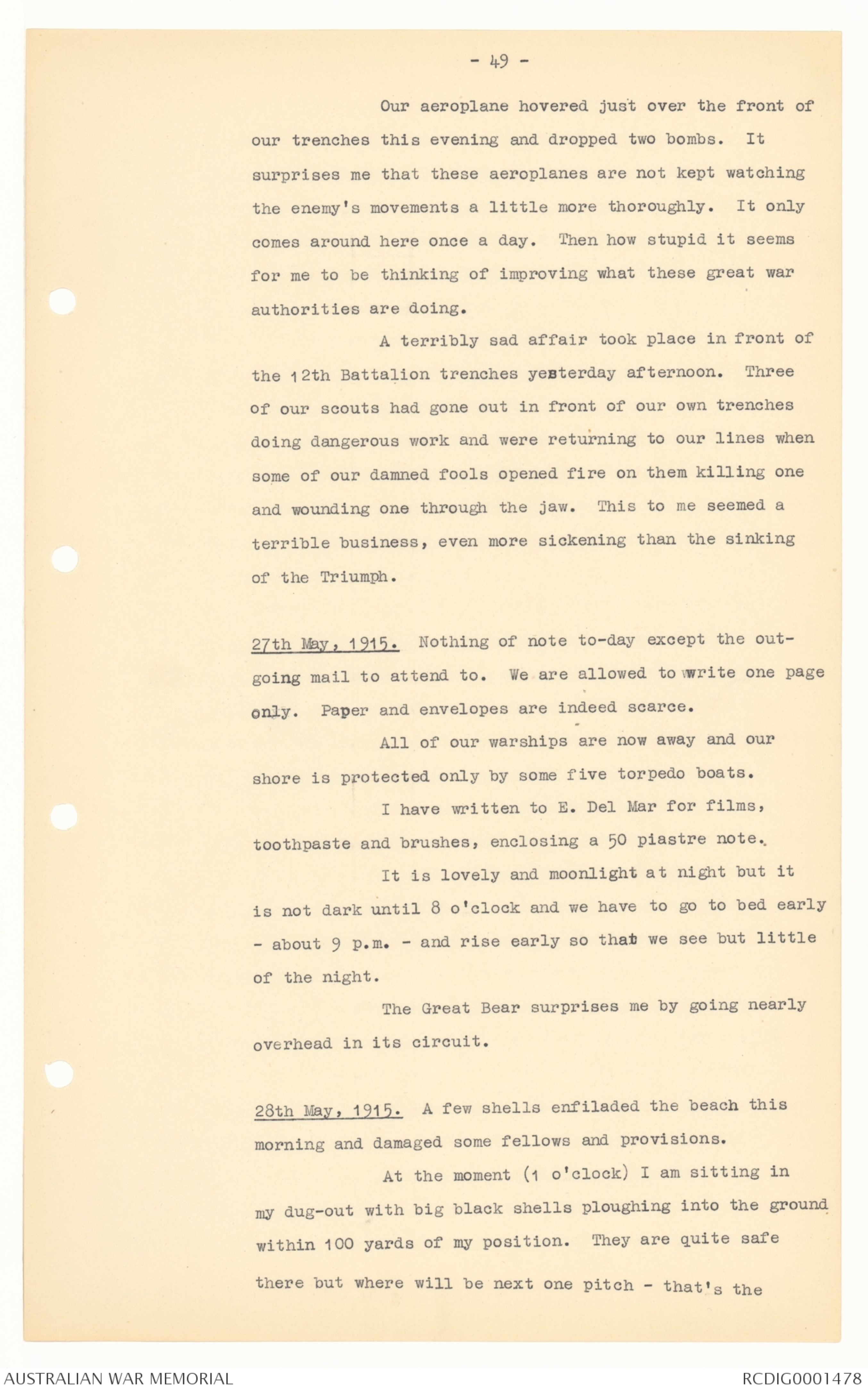
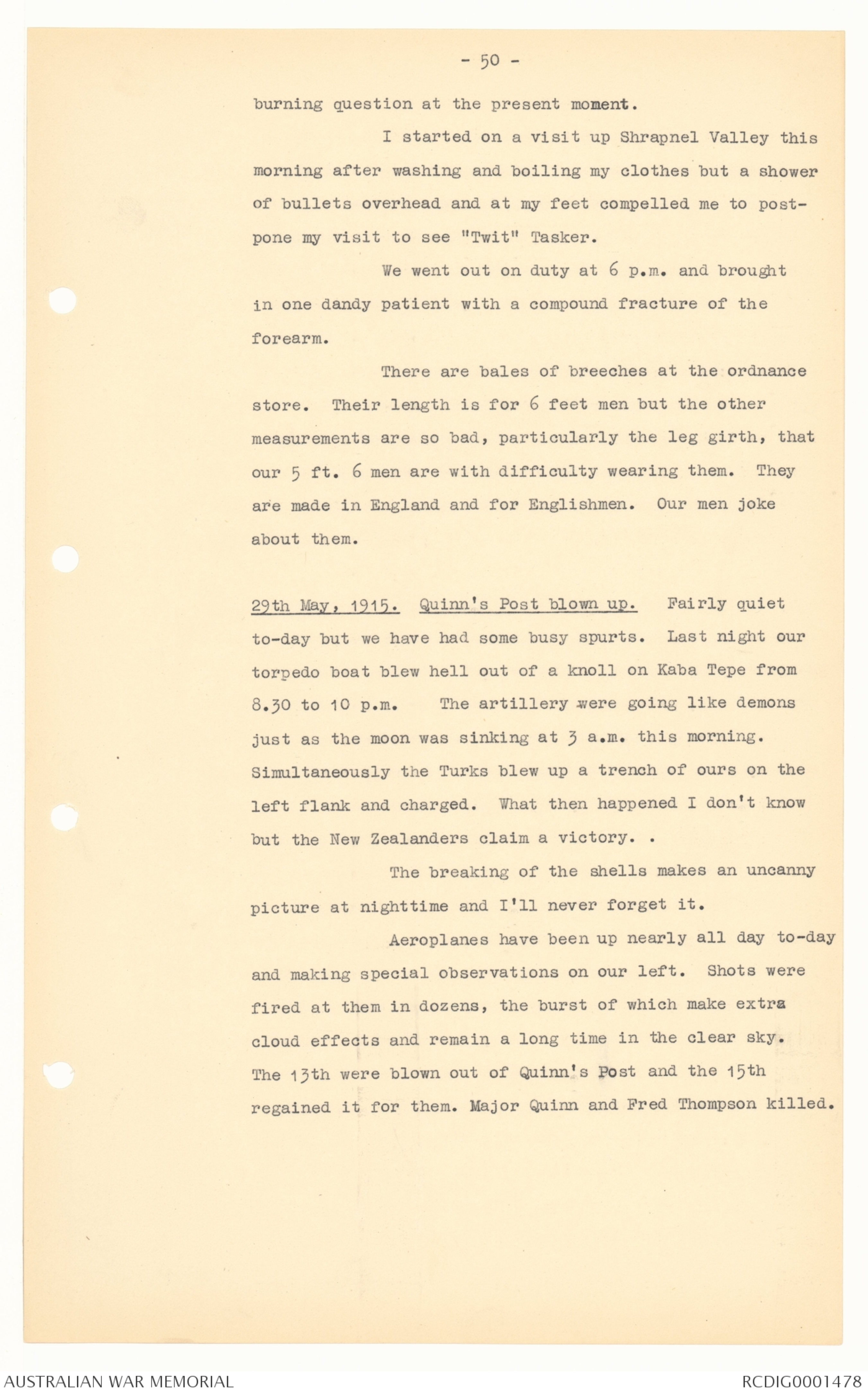
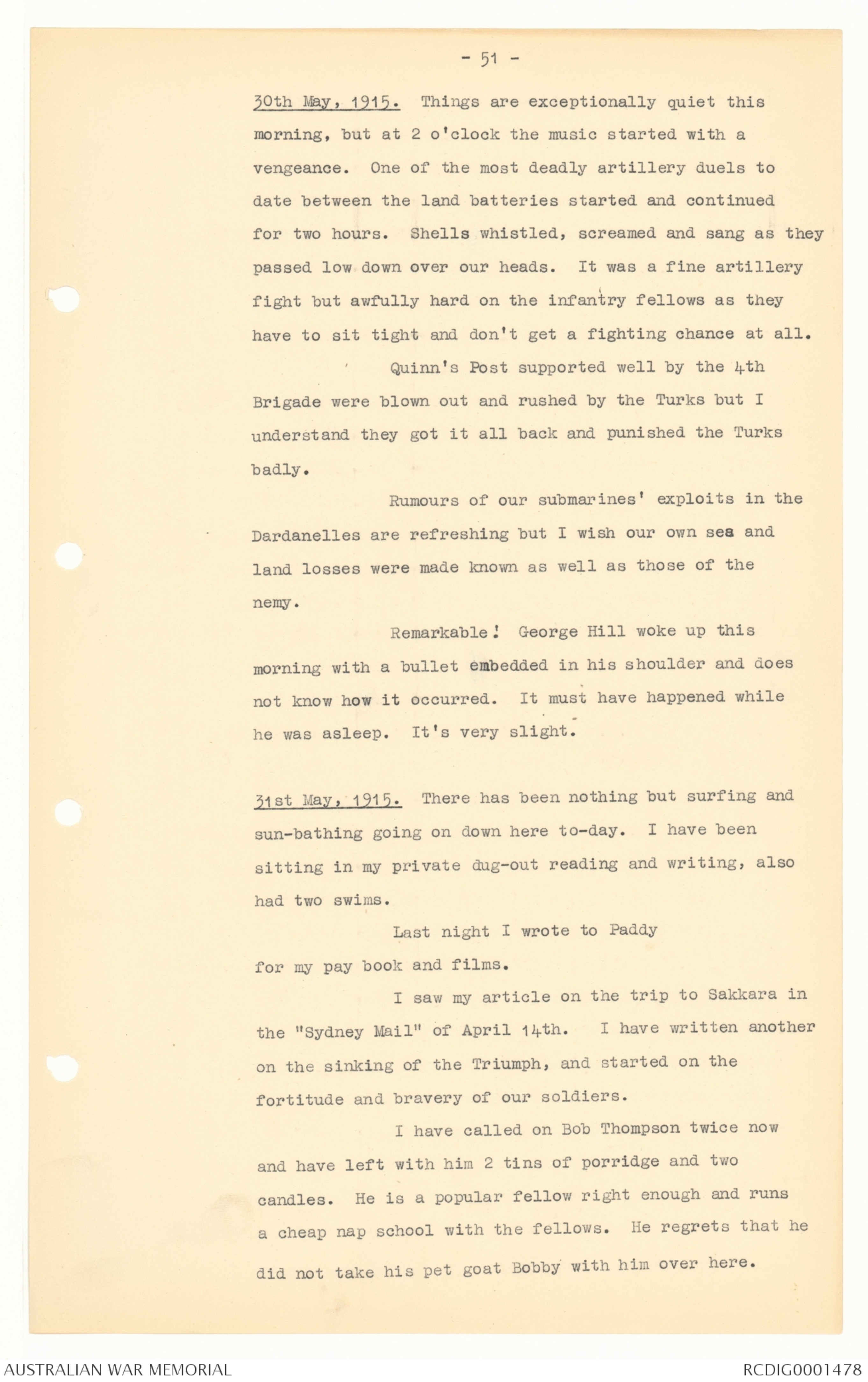
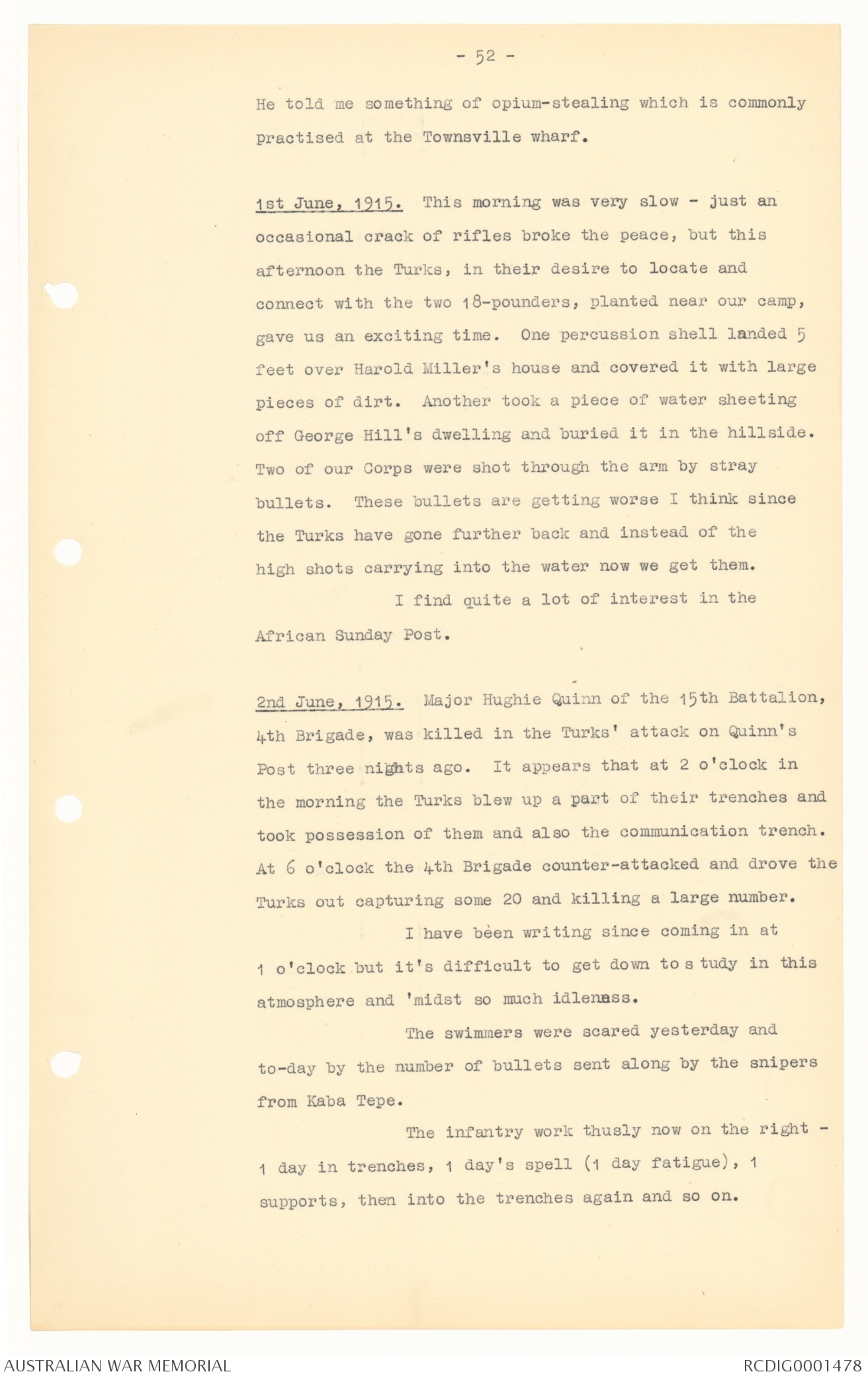
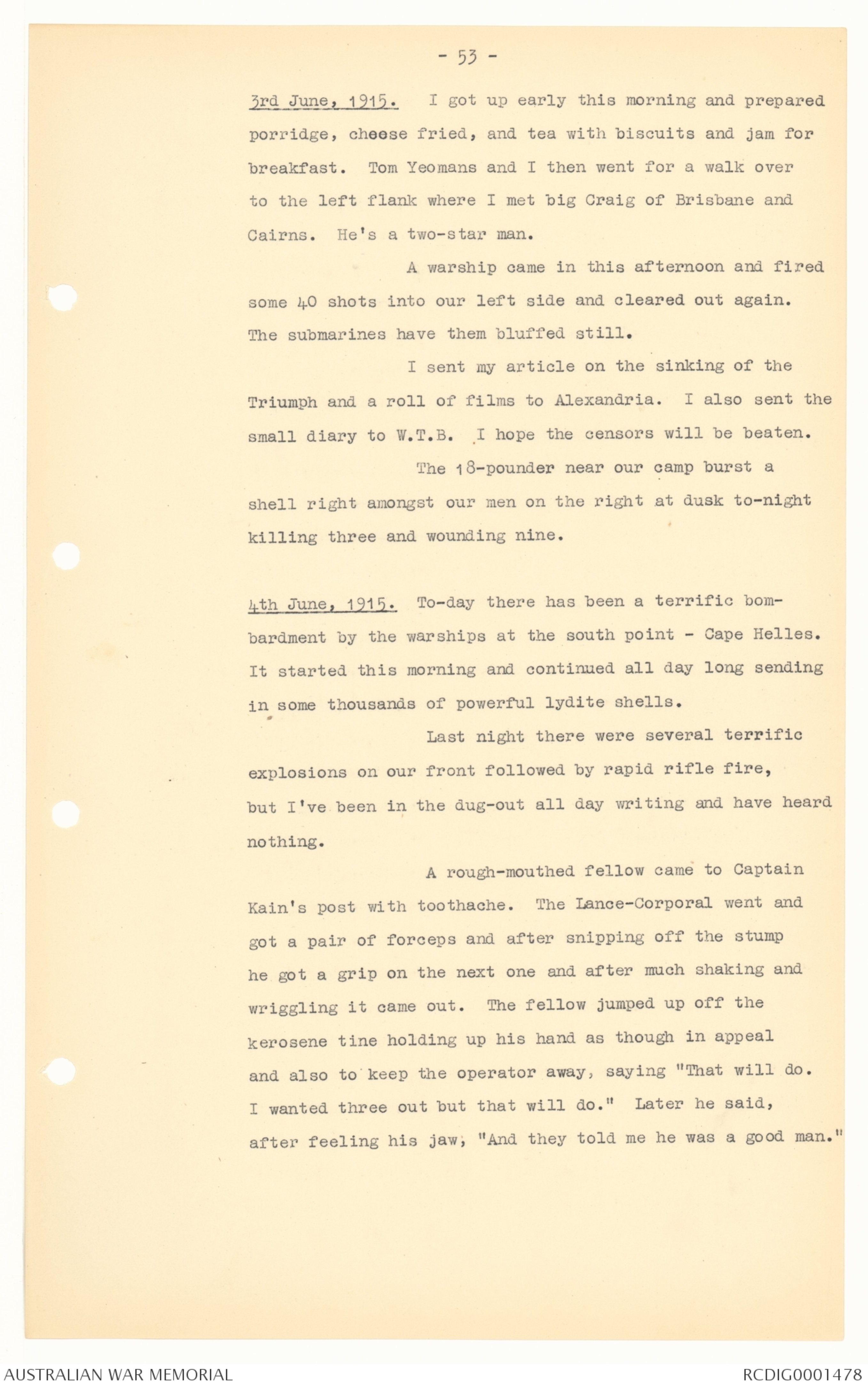
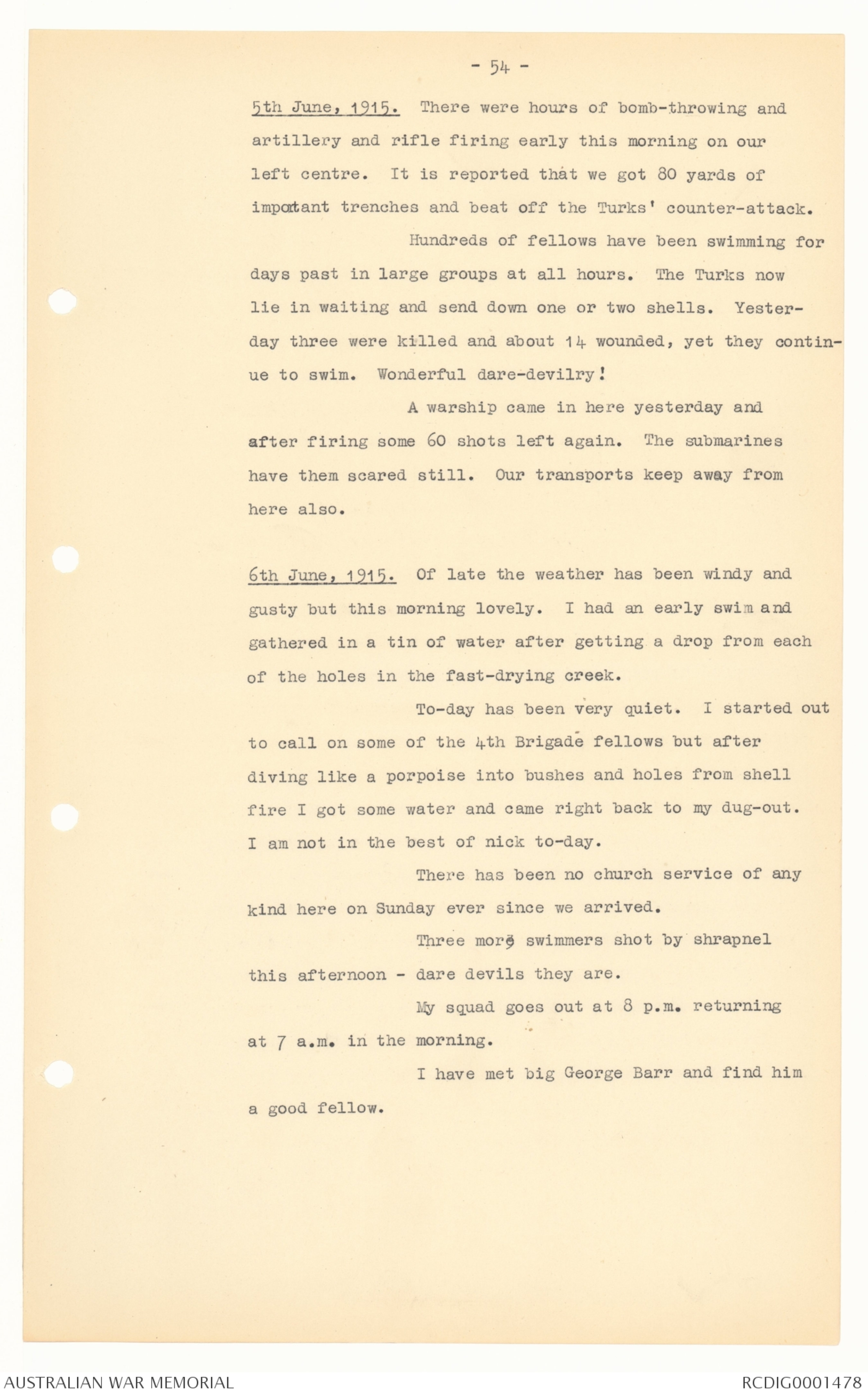
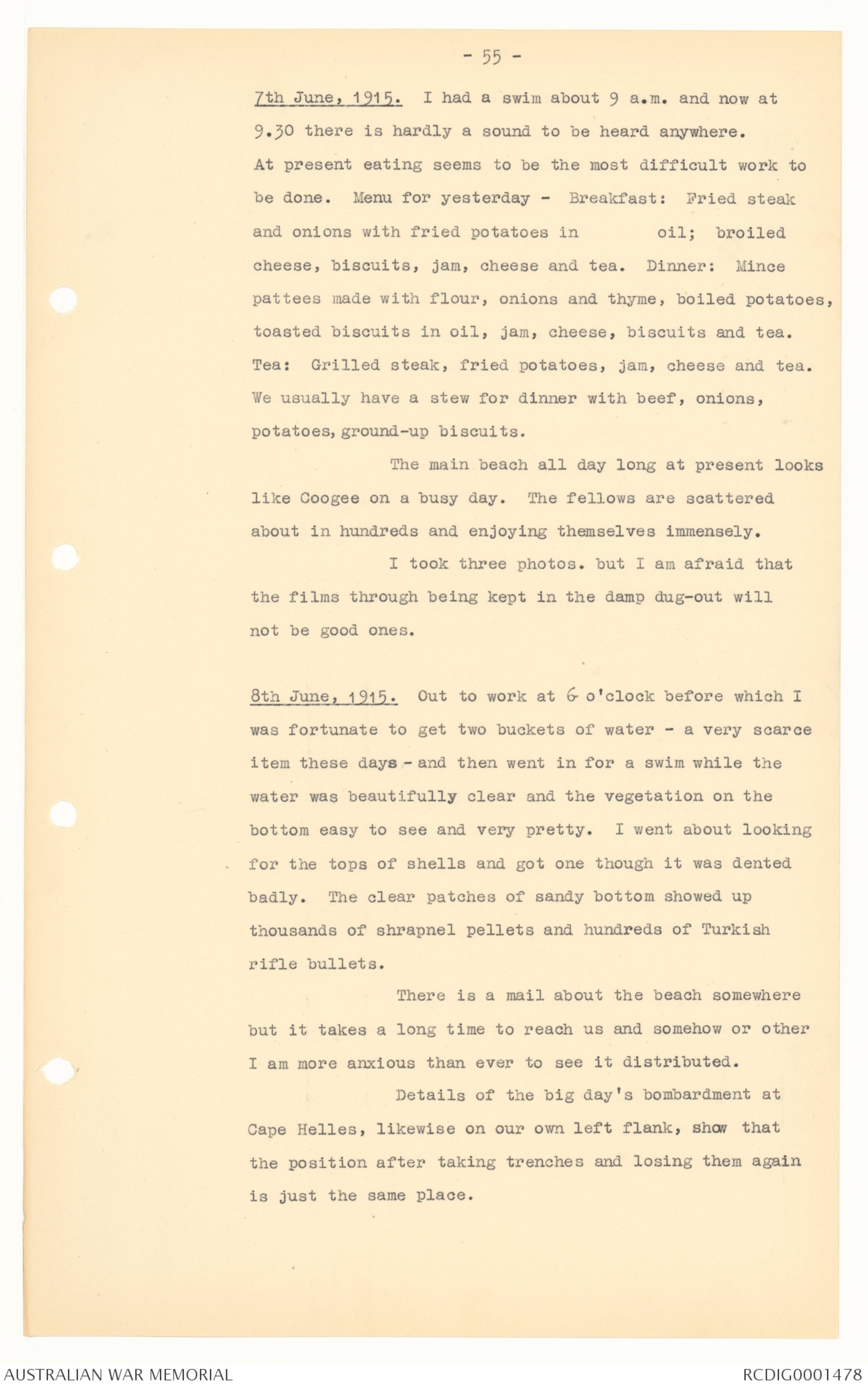
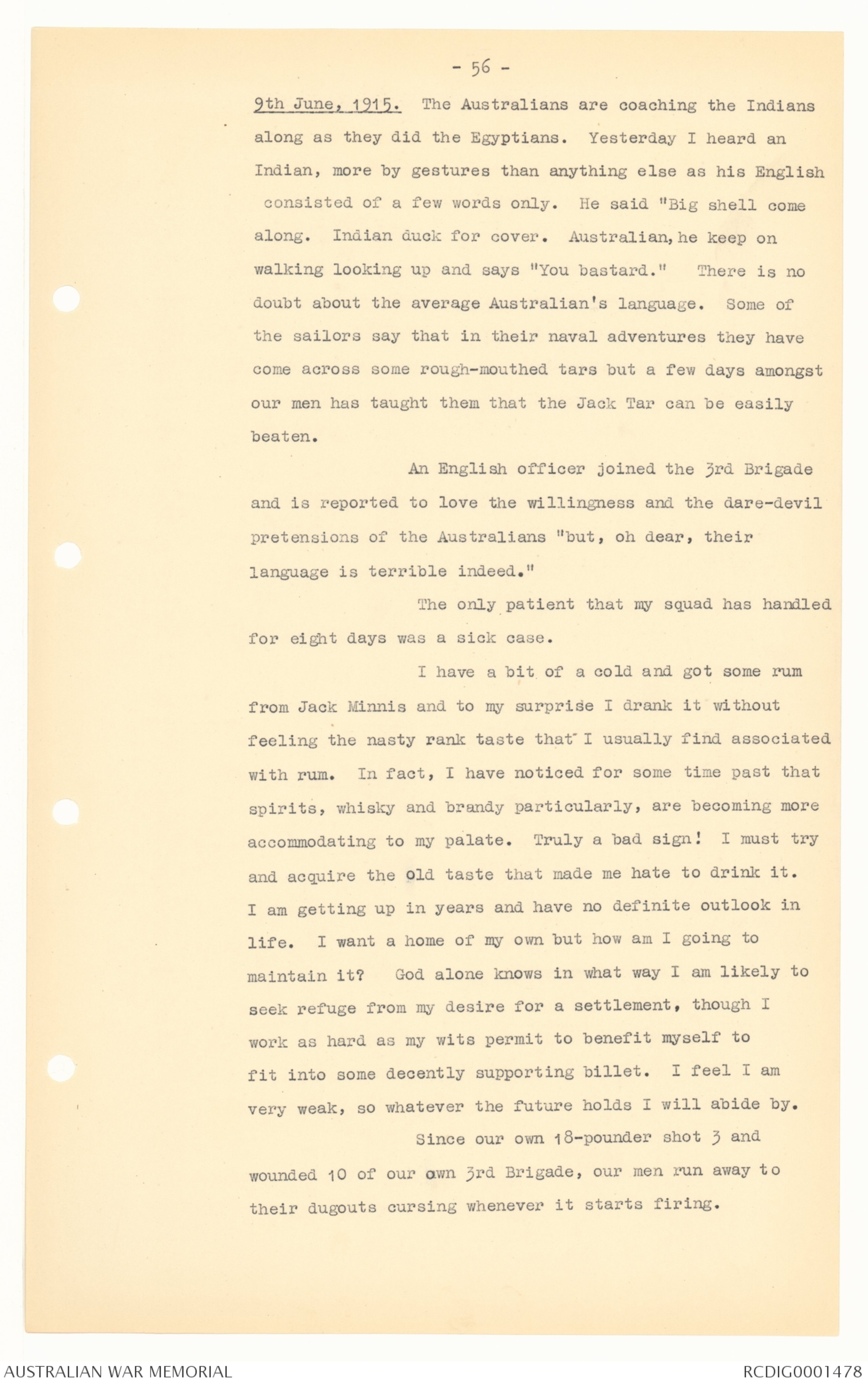
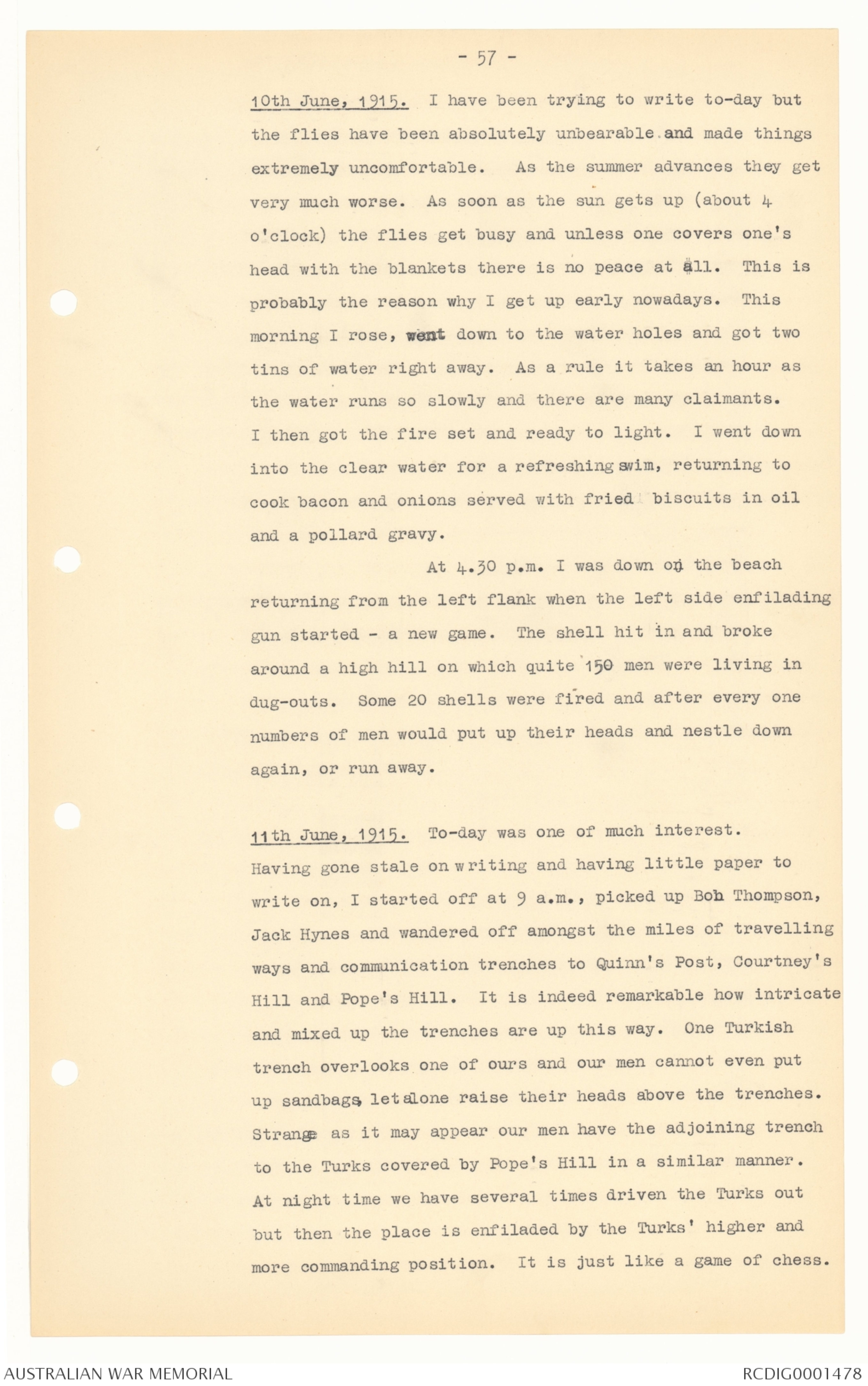
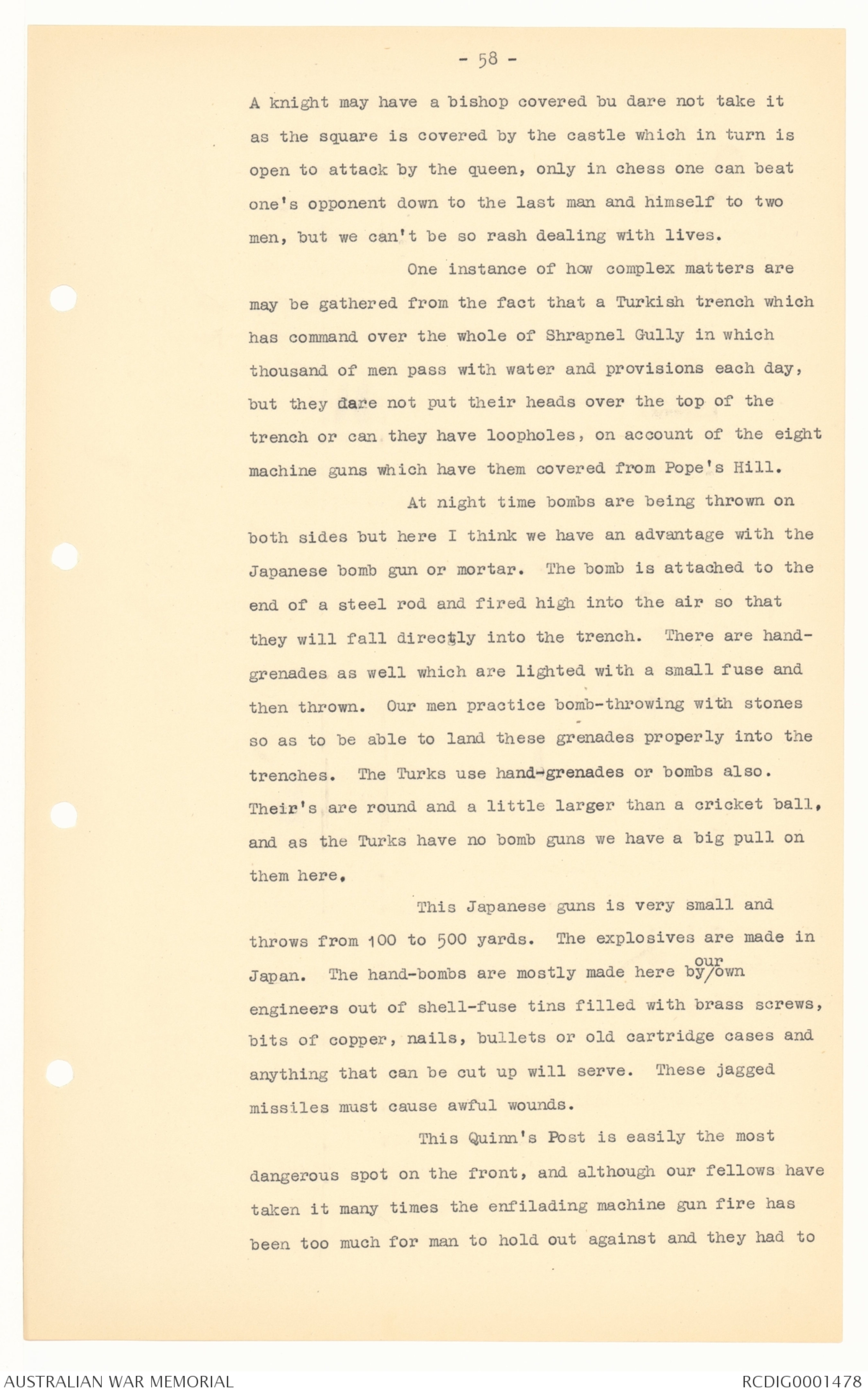
-49-
Our aeroplane hovered just over the front of
our trenches this evening and dropped two bombs. It
surprises me that these aeroplanes are not kept watching
the enemy's movements a little more thoroughly. It only
comes around here once a day. Then how stupid it seems
for me to be thinking of improving what these great war
authorities are doing.
A terribly sad affair took place in front of
the 12th Battalion trenches yesterday afternoon. Three
of our scouts had gone out in front of our own trenches
doing dangerous work and were returning to our lines when
some of our damned fools opened fire on them killing one
and wounding one through the jaw. This to me seemed a
terrible business, even more sickening than the sinking
of the Triumph.
27th May, 1915. Nothing of note to-day except the outgoing
mail to attend to. We are allowed to write one page
only. Paper and envelopes are indeed scarce.
All of our warships are now away and our
shore is protected only by some five torpedo boats.
I have written to E. Del Mar for films,
toothpaste and brushes, enclosing a 50 piastre note.
It is lovely and moonlight at night but it
is not dark until 8 o'clock and we have to go to bed early
- about 9 p.m. - and rise early so that we see but little
of the night.
The Great Bear surprises me by going nearly
overhead in its circuit.
28th May, 1915. A few shells enfiladed the beach this
morning and damaged some fellows and provisions.
At the moment (1 o'clock) I am sitting in
my dug-out with big black shells ploughing into the ground
within 100 yards of my position. They are quite safe
there but where will be next one pitch - that's the
-50 -
burning question at the present moment.
I started on a visit up Shrapnel Valley this
morning after washing and boiling my clothes but a shower
of bullets overhead and at my feet compelled me to postpone
my visit to see "Twit" Tasker.
We went out on duty at 6 p.m. and brought
in one dandy patient with a compound fracture of the
forearm.
There are bales of breeches at the ordnance
store. Their length is for 6 feet men but the other
measurements are so bad, particularly the leg girth, that
our 5 ft. 6 men are with difficulty wearing them. They
are made in England and for Englishmen. Our men joke
about them.
29th May, 1915. Quinn's Post blown up. Fairly quiet
to-day but we have had some busy spurts. Last night our
torpedo boat blew hell out of a knoll on Kaba Tepe from
8.30 to 10 p.m. The artillery were going like demons
just as the moon was sinking at 3 a.m. this morning.
Simultaneously the Turks blew up a trench of ours on the
left flank and charged. What then happened I don't know
but the New Zealanders claim a victory.
The breaking of the shells makes an uncanny
picture at nighttime and I’ll never forget it.
Aeroplanes have been up nearly all day to-day
and making special observations on our left. Shots were
fired at them in dozens, the burst of which make extra
cloud effects and remain a long time in the clear sky.
The 13th were blown out of Quinn's Post and the 15th
regained it for them. Major Quinn and Fred Thompson killed.
-51-
30th May, 1915. Things are exceptionally quiet this
morning, but at 2 o'clock the music started with a
vengeance. One of the most deadly artillery duels to
date between the land batteries started and continued
for two hours. Shells whistled, screamed and sang as they
passed low down over our heads. It was a fine artillery
fight but awfully hard on the infantry fellows as they
have to sit tight and don't get a fighting chance at all.
Quinn's Post supported well by the 4th
Brigade were blown out and rushed by the Turks but I
understand they got it all back and punished the Turks
badly.
Rumours of our submarines' exploits in the
Dardanelles are refreshing but I wish our own sea and
land losses were made known as well as those of the
nemy.
Remarkable! George Hill woke up this
morning with a bullet embedded in his shoulder and does
not know how it occurred. It must have happened while
he was asleep. It's very slight.
31st May, 1915. There has been nothing but surfing and
sun-bathing going on down here to-day. I have been
sitting in my private dug-out reading and writing, also
had two swims.
Last night I wrote to Paddy
for my pay book and films.
I saw my article on the trip to Sakkara in
the "Sydney Mail" of April 14th. I have written another
on the sinking of the Triumph, and started on the
fortitude and bravery of our soldiers.
I have called on Bob Thompson twice now
and have left with him 2 tins of porridge and two
candles. He is a popular fellow right enough and runs
a cheap nap school with the fellows. He regrets that he
did not take his pet goat Bobby with him over here.
-52 -
He told me something of opium-stealing which is commonly
practised at the Townsville wharf.
1st June, 1915. This morning was very slow - just an
occasional crack of rifles broke the peace, but this
afternoon the Turks, in their desire to locate and
connect with the two 18-pounders, planted near our camp,
gave us an exciting time. One percussion shell landed 5
feet over Harold Miller's house and covered it with large
pieces of dirt. Another took a piece of water sheeting
off George Hill's dwelling and buried it in the hillside.
Two of our Corps were shot through the arm by stray
bullets. These bullets are getting worse I think since
the Turks have gone further back and instead of the
high shots carrying into the water now we get them.
I find quite a lot of interest in the
African Sunday Post.
2nd June, 1915. Major Hughie Quinn of the 15th Battalion,
4th Brigade, was killed in the Turks' attack on Quinn's
Post three nights ago. It appears that at 2 o'clock in
the morning the Turks blew up a part of their trenches and
took possession of them and also the communication trench.
At 6 o'clock the 4th Brigade counter-attacked and drove the
Turks out capturing some 20 and killing a large number.
I have been writing since coming in at
1 o'clock but it's difficult to get down to s tudy in this
atmosphere and 'midst so much idleness.
The swimmers were scared yesterday and
to-day by the number of bullets sent along by the snipers
from Kaba Tepe.
The infantry work thusly now on the right -
1 day in trenches, 1 day's spell (1 day fatigue), 1
supports, then into the trenches again and so on.
-53-
3rd June, 1915. I got up early this morning and prepared
porridge, cheese fried, and tea with biscuits and jam for
breakfast. Tom Yeomans and I then went for a walk over
to the left flank where I met big Craig of Brisbane and
Cairns. He's a two-star man.
A warship came in this afternoon and fired
some 40 shots into our left side and cleared out again.
The submarines have them bluffed still.
I sent my article on the sinking of the
Triumph and a roll of films to Alexandria. I also sent the
small diary to W.T.B. I hope the censors will be beaten.
The 18-pounder near our camp burst a
shell right amongst our men on the right at dusk to-night
killing three and wounding nine.
4th June, 1915. To-day there has been a terrific bombardment
by the warships at the south point - Cape Helles.
It started this morning and continued all day long sending
in some thousands of powerful lydite shells.
Last night there were several terrific
explosions on our front followed by rapid rifle fire,
but I've been in the dug-out all day writing and have heard
nothing.
A rough-mouthed fellow came to Captain
Kain's post with toothache. The Lance-Corporal went and
got a pair of forceps and after snipping off the stump
he got a grip on the next one and after much shaking and
wriggling it came out. The fellow jumped up off the
kerosene tine holding up his hand as though in appeal
and also to keep the operator away, saying "That will do.
I wanted three out but that will do." Later he said,
after feeling his jaw; "And they told me he was a good man."
-54-
5th June, 1915. There were hours of bomb-throwing and
artillery and rifle firing early this morning on our
left centre. It is reported that we got 80 yards of
important trenches and beat off the Turks' counter-attack.
Hundreds of fellows have been swimming for
days past in large groups at all hours. The Turks now
lie in waiting and send down one or two shells. Yesterday
three were killed and about 14 wounded, yet they continue
to swim. Wonderful dare-devilry!
A warship came in here yesterday and
after firing some 60 shots left again. The submarines
have them scared still. Our transports keep away from
here also.
6th June, 1915. Of late the weather has been windy and
gusty but this morning lovely. I had an early swim and
gathered in a tin of water after getting a drop from each
of the holes in the fast-drying creek.
To-day has been very quiet. I started out
to call on some of the 4th Brigade fellows but after
diving like a porpoise into bushes and holes from shell
fire I got some water and came right back to my dug-out.
I am not in the best of nick to-day.
There has been no church service of any
kind here on Sunday ever since we arrived.
Three more swimmers shot by shrapnel
this afternoon - dare devils they are.
My squad goes out at 8 p.m. returning
at 7 a.m. in the morning.
I have met big George Barr and find him
a good fellow.
-55 -
7th June, 1915. I had a swim about 9 a.m. and now at
9.30 there is hardly a sound to be heard anywhere.
At present eating seems to be the most difficult work to
be done. Menu for yesterday - Breakfast: Fried steak
and onions with fried potatoes in oil; broiled
cheese, biscuits, jam, cheese and tea. Dinner: Mince
pattees made with flour, onions and thyme, boiled potatoes,
toasted biscuits in oil, jam, cheese, biscuits and tea.
Tea: Grilled steak, fried potatoes, jam, cheese and tea.
We usually have a stew for dinner with beef, onions,
potatoes, ground-up biscuits.
The main beach all day long at present looks
like Coogee on a busy day. The fellows are scattered
about in hundreds and enjoying themselves immensely.
I took three photos. but I am afraid that
the films through being kept in the damp dug-out will
not be good ones.
8th June, 1915. Out to work at 6 o'clock before which I
was fortunate to get two buckets of water - a very scarce
item these days - and then went in for a swim while the
water was beautifully clear and the vegetation on the
bottom easy to see and very pretty. I went about looking
for the tops of shells and got one though it was dented
badly. The clear patches of sandy bottom showed up
thousands of shrapnel pellets and hundreds of Turkish
rifle bullets.
There is a mail about the beach somewhere
but it takes a long time to reach us and somehow or other
I am more anxious than ever to see it distributed.
Details of the big day's bombardment at
Cape Helles, likewise on our own left flank, show that
the position after taking trenches and losing them again
is just the same place.
- 56 -
9th June, 1915. The Australians are coaching the Indians
along as they did the Egyptians. Yesterday I heard an
Indian, more by gestures than anything else as his English
consisted of a few words only. He said "Big shell come
along. Indian duck for cover. Australian, he keep on
walking looking up and says "You bastard." There is no
doubt about the average Australian's language. Some of
the sailors say that in their naval adventures they have
come across some rough-mouthed tars but a few days amongst
our men has taught them that the Jack Tar can be easily
beaten.
An English officer joined the 3rd Brigade
and is reported to love the willingness and the dare-devil
pretensions of the Australians "but, oh dear, their
language is terrible indeed."
The only patient that my squad has handled
for eight days was a sick case.
I have a bit of a cold and got some rum
from Jack Minnis and to my surprise I drank it without
feeling the nasty rank taste that I usually find associated
with rum. In fact, I have noticed for some time past that
spirits, whisky and brandy particularly, are becoming more
accommodating to my palate. Truly a bad sign! I must try
and acquire the old taste that made me hate to drink it.
I am getting up in years and have no definite outlook in
life. I want a home of my own but how am I going to
maintain it? God alone knows in what way I am likely to
seek refuge from my desire for a settlement, though I
work as hard as my wits permit to benefit myself to
fit into some decently supporting billet. I feel I am
very weak, so whatever the future holds I will abide by.
Since our own 18-pounder shot 3 and
wounded 10 of our own 3rd Brigade, our men run away to
their dugouts cursing whenever it starts firing.
-57-
10th June, 1915. I have been trying to write to-day but
the flies have been absolutely unbearable, and made things
extremely uncomfortable. As the summer advances they get
very much worse. As soon as the sun gets up (about 4
o'clock) the flies get busy and unless one covers one's
head with the blankets there is no peace at all. This is
probably the reason why I get up early nowadays. This
morning I rose, went down to the water holes and got two
tins of water right away. As a rule it takes an hour as
the water runs so slowly and there are many claimants.
I then got the fire set and ready to light. I went down
into the clear water for a refreshing swim, returning to
cook bacon and onions served with fried biscuits in oil
and a pollard gravy.
At 4.30 p.m. I was down on the beach
returning from the left flank when the left side enfilading
gun started - a new game. The shell hit in and broke
around a high hill on which quite 150 men were living in
dug-outs. Some 20 shells were fired and after every one
numbers of men would put up their heads and nestle down
again, or run away.
11th June, 1915. To-day was one of much interest.
Having gone stale on writing and having little paper to
write on, I started off at 9 a.m., picked up Bob Thompson,
Jack Hynes and wandered off amongst the miles of travelling
ways and communication trenches to Quinn's Post, Courtney's
Hill and Pope's Hill. It is indeed remarkable how intricate
and mixed up the trenches are up this way. One Turkish
trench overlooks one of ours and our men cannot even put
up sandbags, let alone raise their heads above the trenches.
Strange as it may appear our men have the adjoining trench
to the Turks covered by Pope's Hill in a similar manner.
At night time we have several times driven the Turks out
but then the place is enfiladed by the Turks' higher and
more commanding position. It is just like a game of chess.
- 58 -
A knight may have a bishop covered bu dare not take it
as the square is covered by the castle which in turn is
open to attack by the queen, only in chess one can beat
one's opponent down to the last man and himself to two
men, but we can't be so rash dealing with lives.
One instance of how complex matters are
may be gathered from the fact that a Turkish trench which
has command over the whole of Shrapnel Gully in which
thousand of men pass with water and provisions each day,
but they dare not put their heads over the top of the
trench or can they have loopholes, on account of the eight
machine guns which have them covered from Pope's Hill.
At night time bombs are being thrown on
both sides but here I think we have an advantage with the
Japanese bomb gun or mortar. The bomb is attached to the
end of a steel rod and fired high into the air so that
they will fall directly into the trench. There are hand-grenades
as well which are lighted with a small fuse and
then thrown. Our men practice bomb-throwing with stones
so as to be able to land these grenades properly into the
trenches. The Turks use hand-grenades or bombs also.
Their's are round and a little larger than a cricket ball,
and as the Turks have no bomb guns we have a big pull on
them here.
This Japanese guns is very small and
throws from 100 to 500 yards. The explosives are made in
Japan. The hand-bombs are mostly made here by /^our own
engineers out of shell-fuse tins filled with brass screws,
bits of copper, nails, bullets or old cartridge cases and
anything that can be cut up will serve. These jagged
missiles must cause awful wounds.
This Quinn's Post is easily the most
dangerous spot on the front, and although our fellows have
taken it many times the enfilading machine gun fire has
been too much for man to hold out against and they had to
 Transcriber 17837
Transcriber 17837This transcription item is now locked to you for editing. To release the lock either Save your changes or Cancel.
This lock will be automatically released after 60 minutes of inactivity.